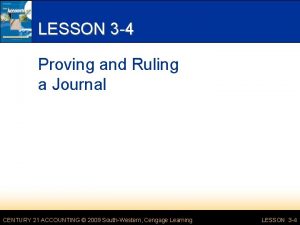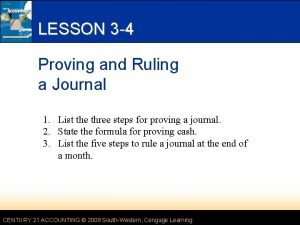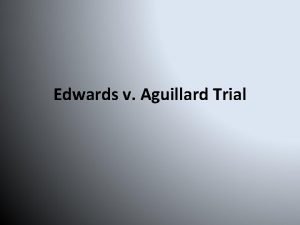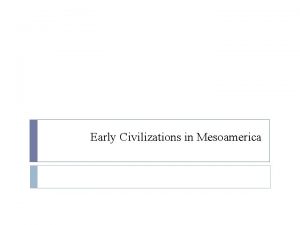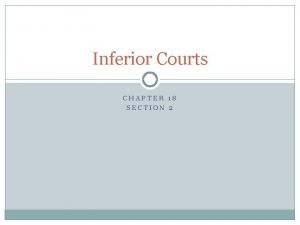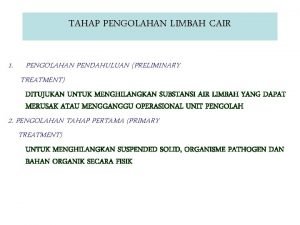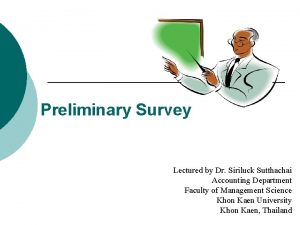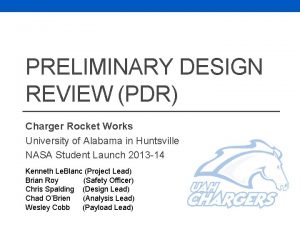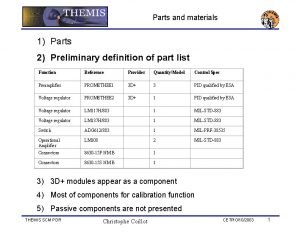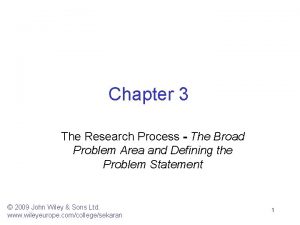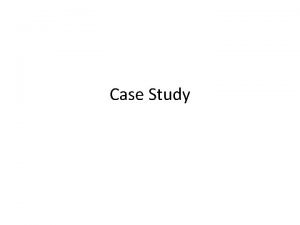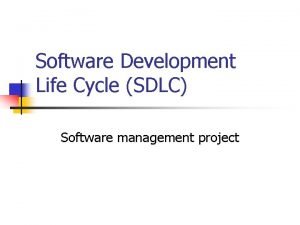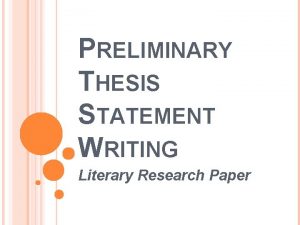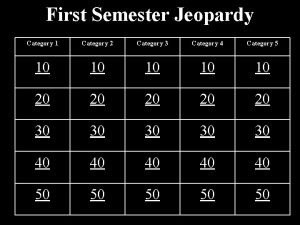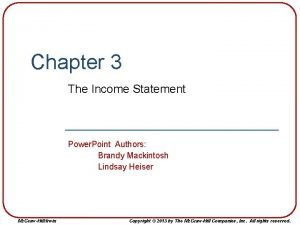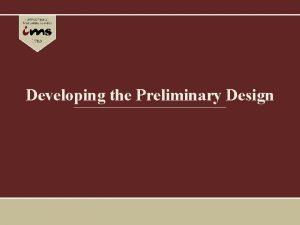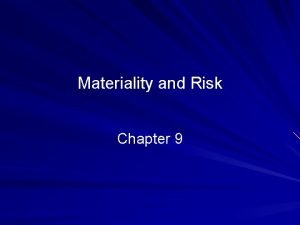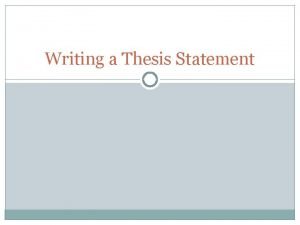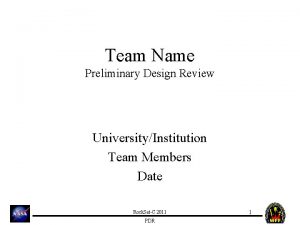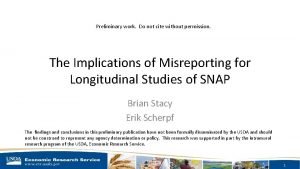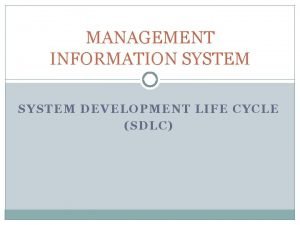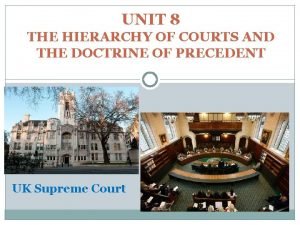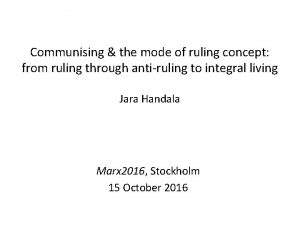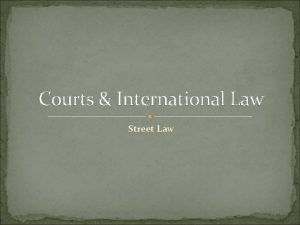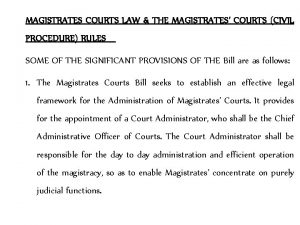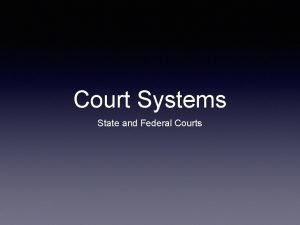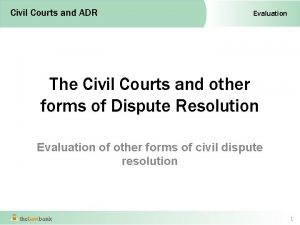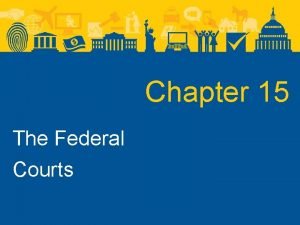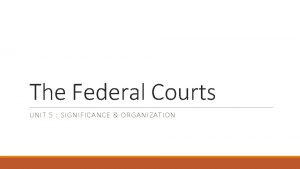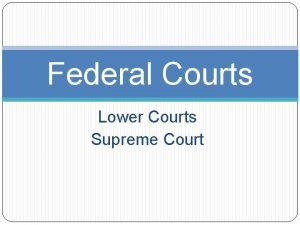National Courts and EU Law The Preliminary Ruling




































































- Slides: 68

National Courts and EU Law: The Preliminary Ruling Procedure Dr Tom O’Shea Academy of EU and International Taxation, London tom@drtomoshea. com

Preliminary Ruling Procedure Article 267 TFEU – • The CJEU has jurisdiction to give preliminary rulings concerning: • (a) the interpretation of the Treaties; • (b) the validity and interpretation of acts of the institutions, bodies, offices or agencies of the Union; • Where such a question is raised before any court or tribunal of a Member State, that court or tribunal may, if it considers that a decision on the question is necessary to enable it to give judgment, request the Court to give a ruling thereon. • Where any such question is raised in a case pending before a court or tribunal of a Member State against whose decisions there is no judicial remedy under national law, that court or tribunal shall bring the matter before the Court. 2

Garcia Blanco C-225/02 para. 27 • it is clear from both the wording and the scheme of Article 234 EC that a national court or tribunal is not empowered to bring a matter before the Court of Justice by way of a reference for a preliminary ruling … • unless a case is pending before it, in which it is called upon to give a decision which is capable of taking account of the preliminary ruling 3

Garcia Blanco para. 28 • The justification for a reference for a preliminary ruling is not that it enables advisory opinions on general or hypothetical questions to be delivered but rather that it is necessary for the effective resolution of a dispute 4

Liga Portuguesa C-42/07 para. 40 • With regard to the information that must be provided to the Court in connection with a reference for a preliminary ruling, it should be noted that information does not serve only to enable the Court to provide answers which will be of use to the national court; • it must also enable the Governments of the Member States, and other interested parties, to submit observations in accordance with Article 23 of the Statute of the Court of Justice. 5

Liga Portuguesa C-42/07 para. 40 • the national court should • define the factual and legislative context of the questions or, at the very least, • explain the factual circumstances on which those questions are based. • set out the precise reasons why the national court is unsure as to the interpretation of Community law and why it considered it necessary to refer questions to the Court for a preliminary ruling. • essential that the national court provide at the very least some explanation of the reasons for the choice of the Community provisions … and of the link which it establishes between those provisions and the national legislation applicable to the dispute 6

Liga Portuguesa C-42/07 para. 41 • the referring court cannot be required to make all the findings of fact and of law required by its judicial function first before it may then bring the matter before the Court. • It is sufficient that both the subject-matter of the dispute in the main proceedings and the main issues raised for the Community legal order may be understood from the reference for a preliminary ruling, in order to enable the Member States to submit their observations in accordance with Article 23 of the Statute of the Court of Justice and to participate effectively in the proceedings before the Court. 7

Cartesio C-210/06 para. 90 • the system established by Article 234 EC with a view to ensuring that Community law is interpreted uniformly throughout the Member States instituted direct cooperation between the Court of Justice and the national courts by means of a procedure which is completely independent of any initiative by the parties 8

Cartesio C-210/06 para. 91 • The system of references for a preliminary ruling is based on a dialogue between one court and another, the initiation of which depends entirely on the national court’s assessment as to whether a reference is appropriate and necessary 9

Cartesio C-210/06 para. 93 • Article 234 EC does not preclude a decision of such a court, making a reference to the Court, from remaining subject to the remedies normally available under national law. • Nevertheless, the outcome of such an appeal cannot limit the jurisdiction conferred by Article 234 EC on that court to make a reference to the Court if it considers that a case pending before it raises questions on the interpretation of provisions of Community law necessitating a ruling by the Court. 10

Cartesio C-210/06 para. 94 • The court at first instance remains free to refer questions to the Court pursuant to Article 234 EC, regardless of the existence of a rule of national law whereby a court is bound on points of law by the rulings of a superior court 11

Cartesio C-210/06 para. 96 • it is for the referring court to draw the proper inferences from a judgment delivered on an appeal against its decision to refer and, in particular, to come to a conclusion as to whether it is appropriate to maintain the reference for a preliminary ruling, or to amend it or to withdraw it. 12

Cartesio para. 97 • in a situation such as that in the case before the referring court, the Court must – also in the interests of clarity and legal certainty – abide by the decision to make a reference for a preliminary ruling, which must have its full effect so long as it has not been revoked or amended by the referring court, such revocation or amendment being matters on which that court alone is able to take a decision. 13

Constitutional Issues – Filipiak C-314/08 para. 81 • a national court which is called upon, within the exercise of its jurisdiction, to apply provisions of Community law is under a duty to give full effect to those provisions, if necessary refusing of its own motion to apply any conflicting provision of national legislation, even if adopted subsequently, • and it is not necessary for the court to request or await the prior setting aside of such provision by legislative or other constitutional means 14

Filipiak para. 82 • Pursuant to the principle of the primacy of Community law, a conflict between a provision of national law and a directly applicable provision of the Treaty is to be resolved by a national court applying Community law, if necessary by refusing to apply the conflicting national provision, and not by a declaration that the national provision is invalid, the powers of authorities, courts and tribunals in that regard being a matter to be determined by each Member State. 15

Filipiak para. 83 • the Court has already held that the incompatibility with Community law of a subsequently adopted rule of national law does not have the effect of rendering that rule of national law non-existent. • Faced with such a situation, the national court is obliged to disapply that rule, provided always that this obligation does not restrict the power of the competent national courts to apply, from among the various procedures available under national law, those which are appropriate for protecting the individual rights conferred by Community law 16

Bettati C-341/95 para. 20 • Community legislation must, so far as possible, be interpreted in a manner that is consistent with international law, in particular where its provisions are intended specifically to give effect to an international agreement concluded by the Community 17

Promusicae C-275/06 para. 68. • the Member States must, when transposing the directives … take care to rely on an interpretation of the directives which allows a fair balance to be struck between the various fundamental rights protected by the Community legal order. • when implementing the … directives, the authorities and courts of the Member States must not only interpret their national law in a manner consistent with those directives but also make sure that they do not rely on an interpretation of them which would be in conflict with those fundamental rights or with the other general principles of Community law, such as the principle of proportionality 18

Domestic Law Adopts EU Law Solution • Pelati C-603/10 para. 18 • where, in regulating purely internal situations, national legislation adopts the same solutions as those adopted in EU law in order … to avoid discrimination against its own nationals or any distortion of competition, it is clearly in the EU’s interest that, in order to forestall future differences of interpretation, provisions or concepts taken from EU law should be interpreted uniformly, irrespective of the circumstances in which they are to apply 19

Pelati para. 19 • it is for the national court alone to assess the precise scope of that reference to European Union law, the jurisdiction of the Court being confined to considering provisions of European Union law only 20

Transportes Jordi C-82/12 para. 40 • the interpretation which … the Court gives to a rule of EU law clarifies and defines the meaning and scope of that rule as it must be or ought to have been understood and applied from the time of its entry into force. • …the rule as thus interpreted may, and must, be applied by the courts even to legal relationships which arose and were established before the judgment ruling on the request for interpretation … 21

Willy Kempter C-2/06 para. 37 • as the Court has pointed out, this case-law must be read in the light of the principle of legal certainty. . . Finality of an administrative decision, which is acquired upon expiry of reasonable time-limits for legal remedies or … by exhaustion of those remedies, contributes to such legal certainty, with the consequence that Community law does not require that administrative bodies be placed under an obligation, in principle, to reopen an administrative decision which has become final in that way 22

Willy Kempter C-2/06 para. 38 • The Court has none the less held that specific circumstances may be capable, by virtue of the principle of cooperation arising from Article 10 EC, of requiring a national administrative body to review an administrative decision that has become final following the exhaustion of domestic remedies, in order to take account of the interpretation of a relevant provision of Community law given subsequently by the Court 23

Willy Kempter C-2/06 para. 39 • the conditions capable of providing the basis for such an obligation of review that have been taken into account by the Court include the fact that the judgment of the court of final instance, by virtue of which the contested administrative decision became final, was, in the light of a decision given by the Court subsequent to it, based on a misinterpretation of Community law which was adopted without a question being referred to the Court for a preliminary ruling … 24

Purposive Approach - de Groot C-385/00 • as far as the exercise of the power of taxation so allocated is concerned, the Member States must comply with the Community rules … and, more particularly, respect the principle of national treatment of nationals of other Member States and of their own nationals who exercise the freedoms guaranteed by the Treaty. 25

Daily Mail Case 81/87 para. 16 • Even though those provisions are directed mainly to ensuring that foreign nationals and companies are treated in the host Member State in the same way as nationals of that State, they also prohibit the Member State of origin from hindering the establishment in another Member State of one of its nationals or of a company incorporated under its legislation which comes within the definition contained in Article 58. 26

France Agri Mer C-383/14 para. 20 • in interpreting a provision of EU law, it is necessary to consider not only its wording but also the context in which it occurs and the objectives pursued by the rules of which it is part 27

Crono Service C-419/12 paras. 27 + 28 • in the context of Article 267 TFEU the Court has no jurisdiction to rule either on the interpretation of provisions of national laws or regulations or on their conformity with EU law • if questions have been improperly formulated or if they go beyond the scope of the powers conferred on the Court by Article 267 TFEU, the Court is free to extract from all the information provided by the referring court and, in particular, from the statement of grounds in the order for reference the elements of EU law which, having regard to the subject-matter of the dispute, require interpretation [Reformulation] 28

Dias C-343/90 paras. 15 + 16 • in the context of that cooperation, the national court, which alone has direct knowledge of the facts of the case, is in the best position to assess, having regard to the particular features of the case, whether a preliminary ruling is necessary to enable it to give judgment. • since the questions submitted by the national court concern the interpretation of a provision of Community law, the Court is, in principle, bound to give a ruling 29

Dias para. 18 • it cannot give a preliminary ruling on a question raised in a national court where, inter alia, the interpretation requested • relates to measures not yet adopted by the Community institutions • the procedure before the court making the reference for a preliminary ruling has already been terminated or • the interpretation of Community law or the examination of the validity of a rule of Community law sought by the national court bears no relation to the actual nature of the case or to the subjectmatter of the main action 30

Dias para. 19 • before making the reference to the Court, the national court should establish the facts of the case and settle the questions of purely national law … • it is essential for the national court to explain the reasons why it considers that a reply to its questions is necessary to enable it to give judgment 31

Aspiro C-40/15 para. 18 • the referring court is bound, as far as possible, to interpret national law in the light of EU law and, in this case, the VAT Directive. 32

Spirit of Cooperation: Article 4(3) TEU • Whilst the spirit of cooperation which must govern the performance of the duties assigned by Article 177 to the national courts on the one hand the Court of Justice on the other requires the latter to have regard to the national court's proper responsibilities, it implies at the same time that the national court, in the use which it makes of the facilities provided by Article 177, should have regard to the proper function of the Court of Justice in this field. [Foglia v Novello Case 244/80 para. 20] 33

Foglia v Novello paras. 14 + 16 • Article 177 is based on cooperation which entails a division of duties between the national courts and the Court of Justice in the interest of the proper application and uniform interpretation of Community law throughout all the Member States. • In exercising that power of appraisal the national court, in collaboration with the Court of Justice, fulfils a duty entrusted to them both of ensuring that in the interpretation and application of the Treaty the law is observed. 34

Opinion 1/09 paras. 66 - 68 • As is evident from Article 19(1) TEU, the guardians of that legal order and the judicial system of the European Union are the Court of Justice and the courts and tribunals of the Member States. • it is for the Court to ensure respect for the autonomy of the European Union legal order thus created by the Treaties • the Member States are obliged, by reason … of the principle of sincere cooperation, set out in … Article 4(3) TEU, to ensure, in their respective territories, the application of and respect for European Union law 35

Opinion 1/09 para. 68 • pursuant to the second subparagraph of Article 4(3) TEU, the Member States are to take any appropriate measure, general or particular, to ensure fulfilment of the obligations arising out of the Treaties or resulting from the acts of the institutions of the European Union. In that context, it is for the national courts and tribunals and for the Court of Justice to ensure the full application of European Union law in all Member States and to ensure judicial protection of an individual’s rights under that law 36

Opinion 1/09 para. 83 • Article 267 TFEU, which is essential for the preservation of the Community character of the law established by the Treaties, aims to ensure that, in all circumstances, that law has the same effect in all Member States… • The preliminary ruling mechanism … aims to avoid divergences in the interpretation of EU law which the national courts have to apply. . . • Further, the national courts have the most extensive power, or even the obligation, to make a reference to the Court if they consider that a case pending before them raises issues involving an interpretation or assessment of the validity of the provisions of European Union law and requiring a decision by them 37

Opinion 1/09 para. 84 • The system set up by Article 267 TFEU therefore establishes between the Court of Justice and the national courts direct cooperation as part of which the latter are closely involved in the correct application and uniform interpretation of European Union law and also in the protection of individual rights conferred by that legal order. 38

Opinion 1/09 paras. 86 + 87 • the principle that a Member State is obliged to make good damage caused to individuals as a result of breaches of European Union law for which it is responsible applies to any case in which a Member State infringes European Union law, whichever is the authority of the Member State whose act or omission was responsible for the breach, and that principle also applies, under specific conditions, to judicial bodies • where European Union law is infringed by a national court … Articles 258 TFEU to 260 TFEU provide for the opportunity of bringing a case before the Court to obtain a declaration that the Member State concerned has failed to fulfil its obligations 39

Endress C-209/12 para. 19 • under Article 267 TFEU, which is based on a clear separation of functions between the national courts and the Court, the latter is empowered only to give rulings on the interpretation or the validity of a European Union provision on the basis of the facts which the national court puts before it • Likewise, it falls exclusively to the referring court to interpret national legislation 40

Broad vs Narrow Interpretation • Jia C-1/05 para. 36: • the free movement of workers, which constitute[s] one of the foundations of the Community, must be construed broadly • Lenz C-315/02 para. 26: • it should be noted that Article 73 d(1) of the Treaty, which, as a derogation from the fundamental principle of the free movement of capital, must be interpreted strictly, 41

New Valmar C— 15/15 para. 28 • The Court has a duty to interpret all provisions of EU law which national courts require in order to decide the actions pending before them, even where those provisions are not expressly indicated in the questions referred to the Court of Justice by those courts [Reformulation] 42

New Valmar para. 29 • even if, formally, the referring court has limited its question to the interpretation of Article 45 TFEU alone, that does not prevent the Court from providing the referring court with all the elements of interpretation of European Union law which may be of assistance in adjudicating in the case pending before it, whether or not the referring court has referred to them in the wording of its questions 43

New Valmar para. 29 • It is, in this regard, for the Court to extract from all the information provided by the national court, in particular from the grounds of the order for reference, the points of European Union law which require interpretation in view of the subject matter of the dispute in the main proceedings 44

Admissibility: Wereldhave C-448/15 paras. 50/51 • The request for a preliminary ruling contains no details on the content of the national provisions applicable to the payment of dividends to investment companies established in Belgium. • The Court is not in a position to determine whether the dividends paid to the recipient companies at issue in the main proceedings are treated unfavourably compared with the dividends paid to such comparable companies established in Belgium. 45

Finanzamt Linz C-66/14 paras. 23 + 24 • it is manifestly clear that the first question bears no relation to the subject-matter of the main proceedings • The first question is consequently inadmissible. 46

Canal Satelite Digital C-390/99 para. 19 • the Court has also stated that, in exceptional circumstances, it can examine the conditions in which the case was referred to it by the national court, in order to assess whether it has jurisdiction. 47

Canal Satelite Digital para. 19 • The Court may refuse to rule on a question referred for a preliminary ruling by a national court only where it is quite obvious that the interpretation of Community law that is sought bears no relation to the actual facts of the main action or its purpose, where the problem is hypothetical, or where the Court does not have before it the factual or legal material necessary to give a useful answer to the questions submitted to it 48

Article 267 TFEU - “court or tribunal” • X AB and Y AB C-200/98 para. 14 • in order to determine whether a body making a reference for a preliminary ruling is a court or tribunal within the meaning of Article 177 of the Treaty, which is a question governed by Community law alone, the Court will take account of a number of factors, such as whether the referring body is established by law, whether it is permanent, whether its jurisdiction is compulsory, whether its procedure is inter partes, whether it applies rules of law and whether itis independent 49

Pretore di Salo Case 14/86 para. 11 • The decision at what stage in proceedings a question should be referred to the Court of Justice for a preliminary ruling is therefore dictated by considerations of procedural economy and efficiency to be weighed only by the national court and not by the Court of Justice. 50

Pretore di Salo para. 12 • the fact that judgments delivered on the basis of references for a preliminary ruling are binding on the national courts does not preclude the national court to which such a judgment is addressed from making a further reference to the Court of Justice if it considers it necessary in order to give judgment in the main proceedings… • Such a reference may be justified when the national court encounters difficulties in understanding or applying the judgment, when it refers a fresh question of law to the Court, or again when it submits new considerations which might lead the Court to give a different answer to a question submitted earlier 51

Different Language Versions • “Man in Black” case C-296/95 para. 36 • the need for a uniform interpretation of Community regulations makes it impossible for the text of a provision to be considered in isolation but requires, on the contrary, that it should be interpreted and applied in the light of the versions existing in the other official languages • all the language versions must, in principle be recognised as having the same weight 52

Divergence: Trento Sviluppo C-281/12 para. 26 • the wording used in one language version of a Union provision cannot serve as the sole basis for the interpretation of that provision, or be made to override the other language versions in that regard. • Such an approach would be incompatible with the requirement that Union law be applied uniformly. • In the event of divergence between the language versions, the provision in question must accordingly be interpreted by reference to the purpose and general scheme of the rules of which it forms a part 53

Germanwings C-452/13 para. 16 • Regulation No 261/2004 does not define the actual arrival time. • That being the case, the need for a uniform application of EU law and the principle of equal treatment require that the terms of a provision of EU law which makes no express reference to the law of the Member States for the purpose of determining its meaning and scope must normally be given an independent interpretation throughout the European Union 54

Brussels Hoofdstedelijk Gewest (BHG) C-275/09 para. 29 • while it is established case‑law that the scope of Directive 85/337 is wide and its purpose very broad … • a purposive interpretation of the directive cannot, in any event, disregard the clearly expressed intention of the legislature of the European Union. 55

Valerie Lyttle C-182/13 para. 26 • the term ‘establishment’, which is not defined in Directive 98/59, is a term of EU law and cannot be defined by reference to the laws of the Member States … • It must, on that basis, be interpreted in an autonomous and uniform manner in the EU legal order 56

Punch Graphix C-371/11 paras. 32 + 34 • it should be noted that Directive 90/435 does not define the concept of ‘liquidation’. • It is true that definition of ‘merger’ appears in Directive 90/434 and not in Directive 90/435. However, that fact does not prevent that definition from being taken into account for the purposes of the interpretation of the concept of ‘liquidation’ within the meaning of Article 4(1) of Directive 90/435. 57

Punch Graphix para. 35 • those directives have the same objective to abolish restrictions, disadvantages or distortions arising in particular from the tax provisions of the Member States for the operations covered by those directives • Accordingly, those directives, governing different types of transnational cooperation between companies, constitute, according to the legislature’s plan, a whole, in that they complement each other. 58

Mattia Manzi C-537/11 paras. 44 + 45 • Directive 1999/32 provides, in Article 4 a(4), that the maximum sulphur content in marine fuels must not exceed 1. 5% by mass. Neither that article nor any other provision of the Directive makes any reference, as regards the maximum sulphur content, to Annex VI. • although the EU is not bound by an international agreement, the fact that all its Member States are contracting parties to it is liable to have consequences for the interpretation of European Union law, in particular the provisions of secondary law which fall within the field of application of such an agreement. • Therefore, it is incumbent upon the Court to interpret those provisions taking account of the [international agreement] 59

Mattia Manzi paras. 50 + 51 • In the present case, the 1997 Protocol is an international agreement to which only certain Member States are contracting parties while others are not. • Therefore, the Court is not required to interpret Article 4 a(4) of Directive 1999/32 in the light of Annex VI 60

TNT Express C-533/08 paras. 60 + 61 • In the case of international agreements, it is settled that such agreements concluded by the European Union form an integral part of its legal order and can therefore be the subject of a request for a preliminary ruling • On the other hand, the Court does not, in principle, have jurisdiction to interpret, in preliminary ruling proceedings, international agreements concluded between Member States and non-member countries 61

Soft Law – Recommendations from the Commission • Grimaldi C-322/88 para. 18 • The national courts are bound to take recommendations into consideration in order to decide disputes submitted to them in particular where they cast light on the interpretation of national measures adopted in order to implement them or where they are designed to supplement binding Community provisions. 62

Baltlanta UAB C-410/13 paras. 64 + 65 • even if those guidelines are not intended to produce binding effects, the national courts are bound to take them into consideration in order to decide disputes submitted to them, in particular where they cast light on the interpretation of national measures adopted in order to implement them or where they are designed to supplement binding European Union provisions • secondly, those guidelines must be interpreted in accordance with the binding European Union provisions which they seek to supplement, namely Regulation No 1260/1999. 63

Finding CJEU Cases • Put the Case Number into the search-box • Type the short name into the “Name of the Parties”-box • Try using text in the textbox that you know is in the case • Insert “tax” in the text-box and click on last 8 days button then search for most recent tax cases • Click on documents-box and limit your search to Judgments/Opinions etc. • Here is the link - http: //curia. europa. eu/juris/recherche. jsf? language=en# 64

Case Study: Marks & Spencer v David Halsey • http: //www. eatlp. org/uploads/Members/Marks__amp__Spencer_decision__text_. pdfhttp: //www. bailii. org/ew/cases/EWHC/Ch/2003/1945. rtf • http: //www. bailii. org/eu/cases/EUECJ/2005/C 44603. html • http: //www. bailii. org/ew/cases/EWHC/Ch/2006/811. rtf • http: //www. bailii. org/ew/cases/EWCA/Civ/2007/117. rtf • http: //www. bailii. org/uk/cases/UKFTT/TC/2009/TC 00005. rtf • http: //www. bailii. org/uk/cases/UKFTT/TC/2009/TC 00181. rtf • http: //www. bailii. org/uk/cases/UKUT/TCC/2010/213. pdf • http: //www. bailii. org/uk/cases/UKUT/TCC/2010/296. pdf • http: //www. bailii. org/ew/cases/EWHC/Ch/2010/2215. rtf • http: //www. bailii. org/ew/cases/EWCA/Civ/2011/1156. rtf • http: //www. bailii. org/uk/cases/UKSC/2013/30. pdf • https: //www. supremecourt. uk/cases/docs/uksc-2011 -0241 -judgment. pdf • http: //www. bailii. org/uk/cases/UKSC/2014/11. pdf 65

Enjoy Beautiful Barcelona 66

BON VOYAGE THANK YOU 67

Dr Tom O’Shea tom@drtomoshea. com Website http: //www. drtomoshea. com/home. html 68
 Preliminary ruling
Preliminary ruling Newton's first law and second law and third law
Newton's first law and second law and third law Si unit of newton's first law
Si unit of newton's first law Proving and ruling a journal
Proving and ruling a journal 3 steps for proving a journal
3 steps for proving a journal Boyles law
Boyles law Charles law constant
Charles law constant Pisces attributes
Pisces attributes Baker v carr ruling
Baker v carr ruling What is ruling class ideology
What is ruling class ideology Ruling out rival hypotheses
Ruling out rival hypotheses Schenck vs united states ruling
Schenck vs united states ruling Edward vs aguillard
Edward vs aguillard Ruling class
Ruling class Ruling type adler
Ruling type adler 30% ruling
30% ruling Troy leon greeg
Troy leon greeg China a
China a Waterfall vs shower approach
Waterfall vs shower approach Preliminary cooking and flavoring
Preliminary cooking and flavoring Circuit court maps
Circuit court maps Preliminary budget
Preliminary budget Preliminary treatment adalah
Preliminary treatment adalah Preliminary survey
Preliminary survey Preliminary reference earth model
Preliminary reference earth model Preliminary design review example
Preliminary design review example Parts of preliminaries
Parts of preliminaries Mla format thesis
Mla format thesis Preliminary interview
Preliminary interview Identify a broad problem area examples
Identify a broad problem area examples Dodero company produces a single product
Dodero company produces a single product Fly leaf sa pananaliksik
Fly leaf sa pananaliksik The 3 p's graphic communication
The 3 p's graphic communication Sdlc
Sdlc Objective thesis statement
Objective thesis statement Preliminary rifle instruction
Preliminary rifle instruction Pearson vue arrt
Pearson vue arrt Juxtaposition
Juxtaposition A preliminary synopsis of a film's action is called a
A preliminary synopsis of a film's action is called a Determine junktrader’s preliminary net income.
Determine junktrader’s preliminary net income. Test a chapter 20 chemical texture services
Test a chapter 20 chemical texture services Preliminary business plan
Preliminary business plan Preliminary prototype
Preliminary prototype Preliminary audit
Preliminary audit Preliminary outline
Preliminary outline Which type of melanin lends black and brown colors to hair?
Which type of melanin lends black and brown colors to hair? Preliminary visits for expatriates
Preliminary visits for expatriates Preliminary objectives
Preliminary objectives Preliminary discussion meaning
Preliminary discussion meaning Preliminary statement definition
Preliminary statement definition ñporo
ñporo Materiality is a relative rather than an absolute concept
Materiality is a relative rather than an absolute concept Ifsqn
Ifsqn Preliminary marketing plan
Preliminary marketing plan Pdr preliminary design review
Pdr preliminary design review What is a situational analysis in first aid
What is a situational analysis in first aid Time management thesis statement
Time management thesis statement Preliminary design review template
Preliminary design review template Introduction
Introduction Preliminary works cited
Preliminary works cited Preliminary research
Preliminary research Pet reading part 6 exercises
Pet reading part 6 exercises Preliminary results example
Preliminary results example The most creative and challenging phase of sdlc is
The most creative and challenging phase of sdlc is Preliminary assessment
Preliminary assessment Preliminary test
Preliminary test Preliminary outline speech
Preliminary outline speech Uk courts hierarchy
Uk courts hierarchy England hierarchy
England hierarchy



